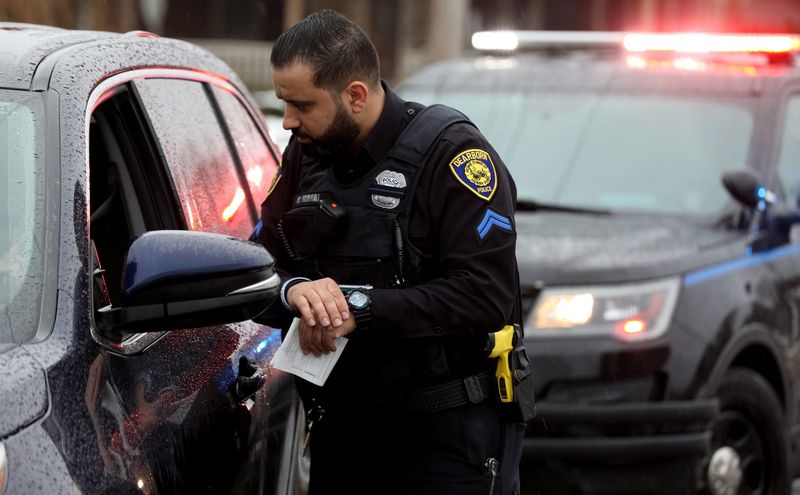If you’re pulled over by police, it’s best to know your rights before it happens so you can protect yourself, experts say.
Traffic stops can have varied outcomes — sometimes the stop turns heated, and in rare cases violent or even deadly. Although the ACLU maintains that police hold the burden of de-escalation, that doesn’t always happen. It’s important for drivers and passengers to use their best judgement and stay calm, said Mark Fancher, an attorney at Michigan’s ACLU.

“The best thing to do is not match their energy” if an encounter with police does become hostile, said metro Detroit civil rights attorney Amir Makled. He said don’t lie and don’t argue. The place to argue is in court, Makled said.
It’s important to know that you have constitutional rights — such as the right to remain silent, to ask for an attorney, and to refuse a search without a warrant or probable cause — regardless of immigration or citizenship status, experts say.
It’s also important to educate yourself on your rights to push back against government overreach, Makled said. Makled, who is representing pro-Palestinian protestors who were arrested at the University of Michigan, was detained by federal agents at the Detroit Metro Airport in April 2025, where they asked him to give up his cell phone. He stood his ground and refused — agents looked at his contact list instead.
After that experience, he’s been visiting schools in Dearborn to educate young people about their rights.
If you’re pulled over by police or federal agents, here’s what advocates say you need to know.
You have the right to remain silent
That includes the driver and all passengers in a car. And if you’re a passenger, you can ask if you’re free to leave. Makled said you don’t have to answer any questions from officers, such as: “Where are you going?”, “Where are you coming from?”, “Do you know why you are being pulled over?”
You are obligated to provide identification, registration, insurance and other documents required by law, Makled said.
If they ask why you aren’t answering their questions, Makled said you can tell them you are choosing to remain silent. And if they become hostile or aggravated, you can ask police if you are being arrested or detained, Makled said.
The ACLU has guidance on how to reduce the risk of harm to yourself once you’re pulled over:
You don’t have to consent to a police search
Fancher said many people aren’t aware that you can refuse consent if police want to search your car without probable cause or a warrant.
“In fact, it’s best not to,” he said. But if you do refuse consent, it’s best to do so politely, he said.
Police can’t search yourself without consent either without probable cause, Fancher said. But they can pat you down for weapons, Fancher said.
Makled said police in Michigan are also no longer allowed to search a vehicle based on the smell of marijuana alone.
If you are arrested or detained
If the traffic stop leads to an arrest or if police detain you, tell officers that you wish to remain silent and immediately ask for a lawyer, according to the ACLU’s guidance. If you are arrested, you have the right to a government-appointed lawyer if you can’t afford one. If you are detained, you have a right to consult with a lawyer.
If you’re arrested, you have the right to make a local phone call. The ACLU says the police are prohibited from listening in on a phone call with a lawyer, but police “can and often will” listen to calls made to others.
And Fancher said you have a right to be free from unreasonable detention during a traffic stop. For example, if you’re being cited for a traffic violation, police can’t detain you for longer than it takes to give you that citation. If they are holding you for longer, Fancher said you can politely ask officers if you’re under arrest and if you’re free to leave.
If your rights were violated
Fancher said it’s also important to write down important details if you think your rights were violated, such as officer’s badge numbers. The ACLU also recommends filing a complaint with the police agency you made contact with, getting contact information from witnesses and document any injuries suffered.
Makled said you are also allowed to record officers, and tell them you are recording them.
If you are undocumented and stopped by immigration, border officials
Regardless of immigration or citizenship status, you have the right to remain silent, to refuse a search without a warrant or probable cause, the right to ask for an attorney, and the right to calmly leave if you’re not under arrest. And these rights apply when stopped by immigration agents as well, according to the ACLU.
National immigrant rights organizations have guidelines for those who are undocumented, or those who aren’t yet a citizen but have papers to legally reside in the U.S.
If you are undocumented, you do not have to, and should not, discuss your immigration or citizenship status with police, immigration, or other officials, including the country you are born in, according to the National Immigrant Justice Center. Anything you say to an officer can be used against you in immigration court, the organization advises.
The National Immigration Law Center also says you shouldn’t carry any documents that show you were born outside of the U.S. — officials can use that to try and deport you.
And you shouldn’t lie or provide false names or documents, either, according to the Michigan Immigrant Rights Center. Provide your full name to officials.
If you’re undocumented but have been living in the country for at least two years, the National Immigration Law Center says you should carry proof, such as your rental contract, church, school records, or mail with a home address and dates. Officials can try and deport you without seeing a judge if you can’t prove you’ve been living in the country for at least two years, the center says.
If you are detained by ICE, you have the right to contact your consulate or have an officer inform the consulate that you’ve been detained, according to the ACLU. It’s also advised that you remember your immigration number — also called an “A” number — and give it to your family to help locate you, the ACLU says. Someone you trust should have copies of your immigration documents.
If you have legal immigration status
The law requires that those with green cards, asylum or refugee status, a valid student or other visa, or temporary protected status should carry your lawful permanent resident card or immigration papers that show your status, according to the National Immigration Law Center. If an officer asks to see documentation, show them.
If your immigration status is pending and not yet valid, you should have a copy of immigration papers that shows that you applied for status or are appealing an immigration decision, the center says. If you’re arrested, show papers to the immigration officer. But if you aren’t arrested, stay silent.
Andrea Sahouri covers criminal justice for the Detroit Free Press. Contact her at asahouri@freepress.com.
This article originally appeared on Detroit Free Press: What are my rights when I’m pulled over by police? What to know in Michigan
Reporting by Andrea May Sahouri, Detroit Free Press / Detroit Free Press
USA TODAY Network via Reuters Connect


